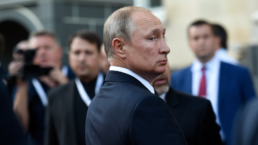Although the regional authorities are desperately trying to do anything to maintain order, they do not seem to be succeeding.
By Boris Kagarlitsky, Russian Dissent
Vladimir Putin, by declaring a “partial” mobilization in Russia, achieved at least one thing: society finally realized that it was in a state of war. In fact, in a few minutes, the president not only destroyed the social contract that had been functioning in the country for the more than two decades of his rule, but also nullified all the work of his own propaganda during the previous 7 months of the conflict with Ukraine.

Until the mobilization was announced, most of the society did not think about the war, and it can be said that they did not even know about it. Of course, propagandists raged on TV literally every day, and on the internet there were fierce battles between supporters and opponents of the military operation in Ukraine. But the apolitical Russian society did not show much interest in this; most people do not watch political television shows, nor do they read political websites, whether oppositional or pro-government. Somewhere in the background there is information about battles and losses, but this is nothing more than the noise of everyday life, which goes on as usual.
On September 21, the situation changed radically and irreversibly. Awareness has come, and resistance has begun with that. Of course, one can be outraged that Russians reacted to the tragedy of Ukraine only when it at last directly affected them. But after all, it took American society several years for public opinion to react to the Vietnam War.
The war has actually became not only a part of public consciousness, but also a defining fact of both public and private life. The first response to the announcement was a mass evasion of mobilization. In the days after Putin’s speech, the number of young men leaving the country far exceeded those who planning to answer the call to mobilize (of course, if one wants to believe the clearly underestimated official figures). The number of people who crossed the border approached 300,00, more than twice as many refuseniks as there are soldiers in Ukraine. And these are only those who ended up in neighboring states. Endless crowds of people gathered at the borders of Kazakhstan and Georgia. They left by personal transport, on bicycles and scooters, even on foot. On the other side of the border, in Kazakhstan, many volunteers met the arrivals and helped them. This is not the first time Kazakhstan has received mass flows of people from Russia – there have always been exiles, evacuees, and settlers. At the same time, thousands of young people remained in Russia but have evaded the clutches of the recruiting stations; some have gone into the woods, and in some places military enlistment offices and administrative buildings have been set on fire.
Recent Posts
“Arrest Now, Ask Questions Later”: Why Did L.A. ICE Agents Arrest and Jail U.S. Citizen Andrea Velez?
July 3, 2025
Take Action Now “They didn’t have vests that said ICE or anything. Their cars didn’t have license plates. … Just because of the color of our…
Trump’s Big, Beautiful Bill Is Naked Class War
July 3, 2025
Take Action Now Trump’s “Big, Beautiful Bill” trades tax cuts on millionaires for the dissolution of society.By Hamilton Nolan, In These Times…
Mayor Mamdani’s First Day, A Zero Hour Conversation With Richard Wolff
July 2, 2025
Take Action Now If elected, what would Mayor Mamdani do on his first day in City Hall? How would a democratic socialist govern as a big-city mayor?……
The U.S. Is Funding A Bloodbath At Gaza Aid Centers
July 2, 2025
Take Action Now The admin just gave $30M to GHF, the organization at the center of charges that Israel is weaponizing assistance and shooting at…




